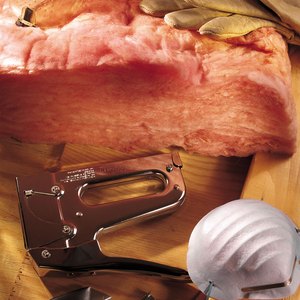
Since heat rises, one of the most likely places for it to escape your home is through the attic and roof. According to the U.S. Department of Energy, “More than 50 percent of the energy used in a typical American home is for space heating and cooling. Much of that conditioned air escapes through poorly sealed, under-insulated attics. Only 20 percent of homes built before 1980 are well insulated.” You can save hundreds of dollars on your annual energy bill by properly insulating your attic.
R-Value
The effectiveness of insulation to hold heat or cool air inside a home is indicated by the insulation’s R-value. The higher the R-value of the insulation, the greater its resistance to heat flow. The R-value is determined by the type of insulation, what it’s made of, how thick it is and its density. The U.S. Department of Energy has a web page that will give you recommended insulation R-values for maximum energy efficiency, based on your zip code.
Types of Insulation
Insulation can be made of a variety of materials, so that some types may require a greater thickness to achieve the same R-value. Fiberglass is among the most common materials. It can be used in unfinished walls, floors and ceilings. Many brands of fiberglass insulation are cut to the standard stud and joint spacing, which makes it an easy insulation to install, particularly if you purchase it in batts and rolls. Other types of material include foam beads, liquid foam, foam board, cellulose, mineral wool and others.
How Much Insulation
How much insulation you need depends on where you live, where you are placing the insulation, and your heating and cooling system. BGE (formerly known as Baltimore Gas and Electric, which serviced the Baltimore area in Maryland) recommends a minimum of R-30 for attic insulation and R-38 as the optimum R-value. The thickness of the insulation might be as much as 12 inches for fiberglass insulation.
Where to Install It
In general, the Department of Energy recommends insulating the access doors to unfinished attic space and the knee wall in finished attic areas. More specifically, don’t cover up your recessed light fixtures or let the insulation touch flue vents or block eave vents, according to BGE.
How Much Can You Save?
BGE says that increasing insulation thickness from 2 to 3 inches (R-5) to 8 to 14 (R-30) inches can save you $95 to $145 per year (in 2010) for every 1,200 square feet of ceiling area. The Department of Energy estimates that you can save up to 10 percent annually on your energy bill when you insulate your attic.
Writer Bio
James Rada, Jr. was a newspaper reporter for eight years and earned 23 awards from the Maryland Delaware D.C. Press Association, Associated Press, Society of Professional Journalists, Maryland State Teachers’ Association and CNHI. He also worked for 12 years as a marketing communications writer, earning a Print Copywriter of the Year Award from the Utah Ad Federation. He holds a Bachelor of Arts in communications.

